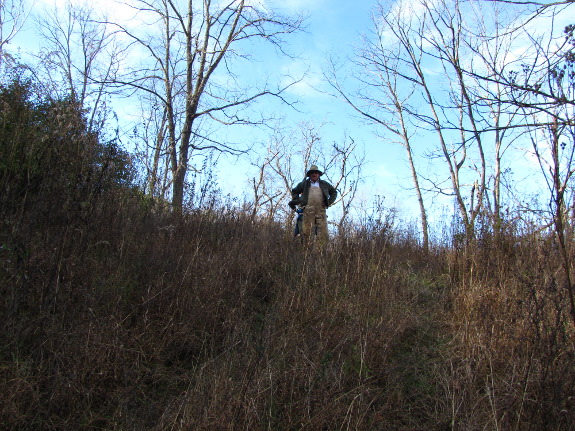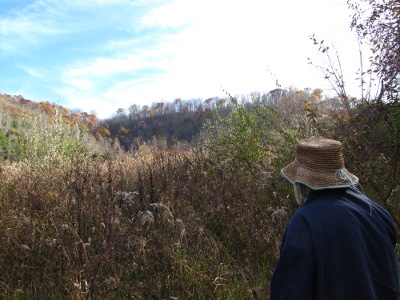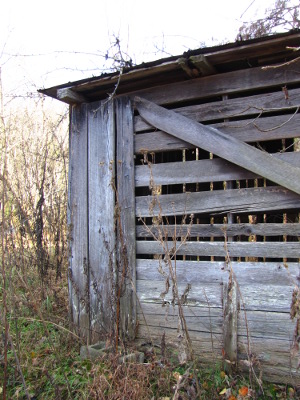
Funding the internship

 The day before Thanksgiving,
we met with the non-profit who owns the
farm we want to share with interns. They were tentatively
enthusiastic about the idea, so I'm starting to work out the nuts and
bolts of the project.
The day before Thanksgiving,
we met with the non-profit who owns the
farm we want to share with interns. They were tentatively
enthusiastic about the idea, so I'm starting to work out the nuts and
bolts of the project.
That means making lists
of locals who can share knowledge about beekeeping, working mules, Salatin-style
pasturing,
organic farming, sustainable forestry, and more. We're figuring
out
which fun and useful projects we can fit into year one on the homestead
--- composting toilets, pasturing chickens and meat goats, improving a
spring, beginning a small garden, playing with aquaponics, maybe
building a tiny kitchen. We might even be able to team up
with a group a couple of miles down the road to give interns a window
into an established intentional community and a spot to take a hot
shower and check their email.
Meanwhile, I'm hashing
out a budget to see if we can afford to hire
someone local to cook the interns supper every day to soften the hard
ground they're camping on and to keep the community from thinking of
the
internship farm as a bunch of crazy hippies. (The intentional
community we hope to hook up with is still known locally as "the hippy
farm" over three decades after establishment.) That, in turn,
means dusting off my grant-writing skills so the
interns can afford to come learn.
 Here's where I want your feedback. I've
decided to donate my book
advance
to the project and have high hopes I can snag at least another $5,000
from foundations to get the internship project off the ground.
But if I put all of my ambitious plans into action --- paying one local
expert per week to lead a quality workshop, feeding interns all three
meals, paying for their tents, buying the supplies and animals to make
the first year's projects a reality, setting aside funds so that one
intern can come for free on a scholarship --- we're still stuck
charging interns $2,000 apiece for a 12 week stay.
Here's where I want your feedback. I've
decided to donate my book
advance
to the project and have high hopes I can snag at least another $5,000
from foundations to get the internship project off the ground.
But if I put all of my ambitious plans into action --- paying one local
expert per week to lead a quality workshop, feeding interns all three
meals, paying for their tents, buying the supplies and animals to make
the first year's projects a reality, setting aside funds so that one
intern can come for free on a scholarship --- we're still stuck
charging interns $2,000 apiece for a 12 week stay.
Is that too much?
Would it sweeten the pot if we teamed up with a
local school and gave college credit? Or would you rather see the
fee cut in half for a simplified internship --- fewer local experts
(only the ones who I wouldn't have to pay), less or no food, bring your
own tent, etc.?
Want more in-depth information? Browse through our books.
Or explore more posts by date or by subject.
About us: Anna Hess and Mark Hamilton spent over a decade living self-sufficiently in the mountains of Virginia before moving north to start over from scratch in the foothills of Ohio. They've experimented with permaculture, no-till gardening, trailersteading, home-based microbusinesses and much more, writing about their adventures in both blogs and books.
Want to be notified when new comments are posted on this page? Click on the RSS button after you add a comment to subscribe to the comment feed, or simply check the box beside "email replies to me" while writing your comment.

I think a useful exercise might be to map out your prospective groups from which interns might come from, in the same way you segment your markets when coming up with a campaign for a product. I can see some incongruence between characteristics of one type of intern viz a viz what you're offering. Folks who'd be willing to stay in tents for 12 weeks and go without email are not the folks who are going to pay anything, let alone $2000. Do you need to offer formal workshops? That's an expense you only need to consider if you're trying to get more city folk who expect formal explicit learning. Folks who'd be willing to sleep in tents might be okay with more of an apprenticeship model, where they just follow your experts around and actually do stuff.
Some of the ways to break participants into segments are: age, level of education, transitioning to homesteading or just enjoying themselves, newbies/some experience/skilled, able to sustain themselves on savings/entirely without income or savings, history of committing and completing projects/history of floating around, etc. Who are you interested in attracting? What do you estimate are their must-haves and deal-breakers for this experience? (and what do they probably not care about) Just as important -- who do you NOT want to be working with at this juncture? What will attract them? what will encourage them to tell you what you want to hear so they can come and hang out with you? What are your own goals in doing this? Help for yourself and your neighbours? The pleasure of teaching others? Job creation for your local economy via directing some grant $$ to locals for workshops? To have some new people around to exchange ideas with? If you're goal is to be teaching others, one thing to think about is who is most likely to benefit from the experience? Do you want someone who is going to start a similar operation (therefore probably older and with some $$$ in the bank and a family of helpers) or do you want someone who will impact others (maybe a university student leader, with no money)
Thanks for the thoughtful comment, J! That's exactly the things I'm trying to think out, which is why I made the post --- hoping that the sort of people we want to attract would be similar to the ones who read our blog and could tell us what would make the internship attractive to them.
I'm a bit on the fence about who I want to attract. In an absolutely perfect world, I'd like to attract people of several different ages and experience levels, mostly people who are transitioning to homesteading rather than just having fun (but as long as they're passionate about it, I don't really care how likely they are to be truly homesteading in the next year or two). The real sticking point to me is that we attract people who commit and are really interested, not floaters --- we attracted the latter when we tried out WWOOF and we're not going there again.
I figured that more serious people would be interested in a more solid experience, thus the extra teachers and charging for the experience. Having at least one student come for free on a scholarship works around the problem of cost turning away people who can't afford it.
From a personal point of view, my top goals are:
The way I have it planned out at the moment, I'm figuring on getting no net labor out of the internship --- we'll be putting about the same amount of labor into making the program happen as we'll get back from interns helping out a couple of mornings a week on the farm.
I am a teacher in my mid-twenties, a (relatively) newly wed with an 8 month old son. My interest in homesteading and sustainable living in general has come primarily from reading the economic thoughts of the Distributists and the papers of the Catholic Land Movement.
My wife and I are looking to transition into homesteading over the next couple of years and I would love to participate in an internship like this. While two months (June/July, or early-June to early August) would be perfect, I think 12 weeks is a bit long for someone who has to provide for a family, unless that family can somehow be accommodated otherwise.
The sleeping in tents thing obviously wouldn't work well with a young one either. However, even with these obstacles, I'm excited to learn more about this internship program and how I might be able to get involved.
Zach --- Mark and I were pondering making a few different internship possibilities available if there was enough interest. Maybe some weekend opportunities for folks with very little time? And I suspect we could work around folks like you with two months to spare instead of three as well.
We haven't really talked it over, but I think that families like yours could probably be accommodated in some way. You'd be outside the action if you spent all your time over at the more established intentional community, but I'm sure you could spend some time there. And if you had access to a camper, you might be able to bring it up to the internship land and live in a bit more luxury than the tent campers. We'll have to ponder families some more and would be glad to hear your input.
Hey sweetie,
You might write Kira about this and ask about her Hawaii experiences. I know the whale / dolphin project she was part of was funded, at least in part, by interns who were willing to pay to hang out with marine mammals and to watch the scientists in action. Dolphins (and Hawaii) are sexier than farming, but she might be able to give you an idea of a price range. I know they also kept the interns busy -- they didn't just sit around and work on their tans -- there were classes, projects, etc. -- so you might get some ideas from that also.
Just a thought!
Hi Anna I am very excited about the development of this unique opportunity and all it offers for anyone involved. Initial thoughts below: Cook I am thinking instead of paying a cook - that you perhaps pay a general overseer (someone like your fantastic Mother who has a lot of knowledge to share) and select 1-2 interns whose primary focus will be the nutrition of the intern group. The overseer will facilitate the menu - manage the food budget and teach the interns how to make good nutritional meals on a budget and with locally grown foods. Interns - Their Investment Personal commitment - must bring own camping gear - you establish what they need - they come prepared. They have to have a vested interest in their success in this opportunity. I have more thoughts and questions Jayne
Heather --- You're right --- Kira's internship was quite a bit like the one I'm envisioning. I'll have to pick her brains...
Jayne --- I considered having one (or more) of the interns come on a "cooking scholarship" where they pay their way with labor. But I'm just not sure --- it's so hard to vet someone on cooking abilities long distance, and I really like the idea of putting that money in a local person's pockets. We might try something like that in year two or three, once we've found someone who's willing to stay on the farm full time and get a garden going in advance to grow a lot of the vegetables for the interns.
Good point about just making them bring their own camping gear. It is a bit personal --- probably most people would prefer that.
"They have to have a vested interest in their success in this opportunity." I totally agree. What do you think is the best way to set up the internship to make that happen?